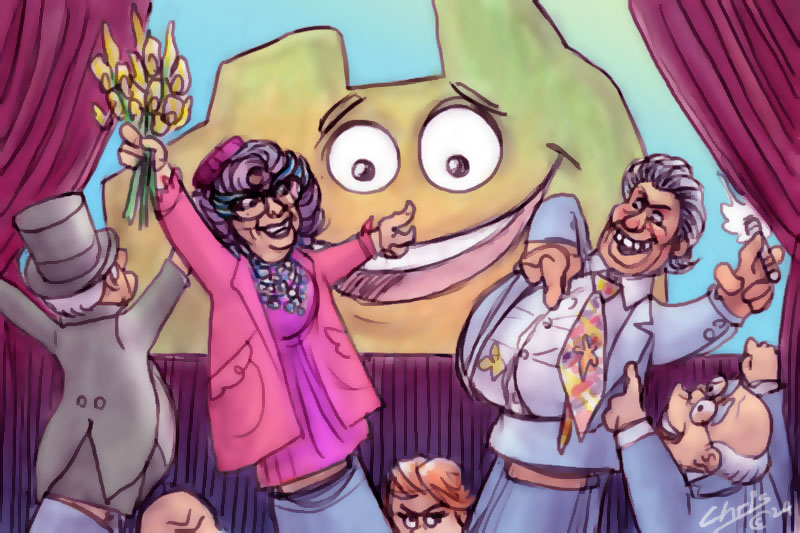A long-running chapter of Australian political satire will close when The End of the Wharf As We Know It has its final performance next year. The 25th and final iteration of the Wharf Revue — the brainchild of co-writers, directors and stars Jonathan Biggins, Drew Forsythe and Phillip Scott — is now on tour.

As ever, the show takes aim in sketches and songs at social and political targets ranging from Pauline Hanson, who has her own cabaret number, ‘Please Explain’, to Anthony Albanese, Peter Dutton, Jacqui Lambie and many others.
And the pollies, for their part, have been good sports. Throughout the Revue’s 25 years, Australia’s politicians have revelled in its brand of good-natured mockery, with the likes of Bob Hawke, Anthony Albanese, and Tanya Plibersek attending.
Drew Forsythe says the Wharf Revue was created in the vein of larrikin humour that characterised a lot of Australian comedy. Its influences are eclectic — among them vaudeville, The Goon Show, Tom Lehrer, and Gilbert and Sullivan.
Australia has a long tradition of social and political satire. Barry Humphries looms large. He sent up the mores and pretensions of suburban Melbourne with Mrs Edna Everage, the Moonee Ponds housewife who over the decades blossomed into a full-blown international megastar. The well-endowed, supremely vulgar Sir Les Patterson rose from being a leagues club entertainment officer to an international cultural attaché but, as he might say, maintained his roots in Australia. He caused some consternation at home and can still startle the unwary, particularly Americans. Humphries, a self-described political conservative, was uncommonly an Australian satirist not of the left but his creations discomfited all sides. ‘I knew Barry quite well — he never felt conservative to me,’ Forsythe says. ‘He got very stirred up by the “woke” movement,’ and Forsythe has some sympathy there. ‘I think they go way too far.’
Television has been a particularly fertile ground for Australian political satire. The Mavis Bramson Show (1964–68) took digs at such figures as prime minister Robert Menzies, and characters like Ocker examined Australian stereotypes; The Naked Vicar Show gave birth to Kingswood Country. That sitcom made the life and prejudices of an ordinary Aussie bloke the comic focus. It was lighter in tone than its British antecedent Till Death Us Do Part, something that could be said for a lot of Australian satire, which tends to poke fun rather than draw blood.
'Satire is not an effective way to bring about change — it’s about highlighting and mocking foibles and absurdities, laughing instead of crying.'
In the 1980s, The Gillies Report was close in spirit and style to what the Wharf Revue would be, with Max Gillies and other actors caricaturing politicians and prominent figures in sketches and songs — many of the latter written by Scott.
Shaun Micallef’s Mad As Hell brought its host’s more absurdist spin to political interviews. The inimitable John Clarke and Brian Dawe, however, took a different approach to Micallef and the Wharfies. Their deadpan political dialogues didn’t provide vocal or visual parodies of the subjects but imitated their ways of speaking and of answering, or rather dodging, interview questions.
On radio, How Green Was My Cactus has provided short bursts of satire for decades, and Rubbery Figures used puppet caricatures in much the same vein as Britain’s Spitting Image. In longer form, the sitcoms Frontline, The Hollowmen and Utopia skewered TV journalism, political advisers and government departments respectively. The Chaser troupe attracted both praise and criticism for their brazen stunts, among them breaching an APEC security zone with Chas Licciardello dressed as Osama bin Laden.
One medium where Australia excels in satire is the newspaper cartoon (very imaginative and generally spot on, Forsythe says). Past and present cartoonists including David Rowe, Ron Tandberg and Bruce Petty, to name a few, have given him many laughs and some heartfelt moments.
But satire is not an effective way to bring about change — it’s about highlighting and mocking foibles and absurdities, laughing instead of crying. Forsythe says, ‘I don’t know that anything we do has any effect. We just keep doing what we do, reinforcing things people already know. It gives you a chance to articulate it and have a laugh at it or feel genuine emotion about it.’
A rewritten version of Paul Simon’s America, bemoaning the polarised state of that nation, provides a particularly poignant moment in the Wharf Revue’s final show. Forsythe supports the right to protest and has even taken part but thinks this ultimately just ‘allows people to let off steam’ rather than achieving anything. But he’s not a defeatist or a nihilist, just a pragmatist and a realist. ‘There are more effective ways of making your voice heard and making change.’ Forsythe says the people who are involved in running elections — handing out materials, cooking sausages — are part of this as are those who vote, maintaining Australia’s democracy and participating in it. ‘By being supportive of a party, you do achieve something.’
And in the meantime, you can have a laugh.
While the Wharf Revue will soon be gone, Australian satire will continue. Society in general and politics in particular provide an endless supply of material.
The End of the Wharf Revue As We Know It is on tour until April 2025. See: softtread.com.au.
Ron Cerabona is an arts reporter for The Canberra Times.
Main image: Chris Johnston illustration